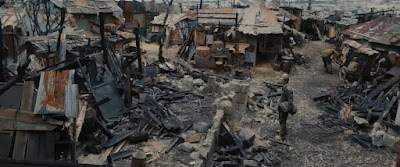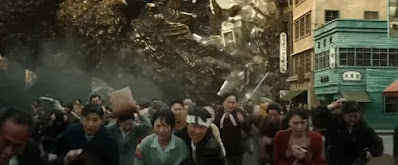 Ikiru (aka "To Live" aka 生きる)(Akira Kurosawa, 1952) For those who've seen more than just Akira Kurosawa's samurai films, this is the one that is most often cited as his crowning achievement.
Ikiru (aka "To Live" aka 生きる)(Akira Kurosawa, 1952) For those who've seen more than just Akira Kurosawa's samurai films, this is the one that is most often cited as his crowning achievement.Hard to argue.
Short on visual majesty, except in the sort of composition and eye for detail that Kurosawa brought to every film, with very little of what one would call "action," and inspired by the director's love for Russian Literature, Ikiru tells the story of a simple bureaucrat, a paper-shuffler, "a walking corpse," as the narrator describes "the protagonist."
Set in contemporary Japan, it follows Kanji Watanabe (Takashi Shimura), a Kainan civil servant (with the uninspiring title of "Section Chief of Public Affairs") who has worked for the same department for 30 years and who (we are told) has been "dead for twenty years"—that's around the time his last white paper on steps to improve efficiency in his department was summarily dismissed by his "higher-ups".
We see a typical day at his office. Kanji rubber-stamping papers with barely a glance, the same way that he handles a request from Sakai (Haruo Tanaka) about the concerns of the Kuroe Women's Association—they want to drain a local cess-pool and create a children's park on the site, eliminating a health hazard and providing a benefit for Japan's version of "baby-boomers." Kanji basically runner-stamps them, sending them off to Public Works without any sort of entree or recommendation, where the mothers go through an all-day session of bureaucracy runarounds only to end up exactly where they started.
Only when they return to his desk, Kanji is not there—he has uncharacteristically taken time off from his duties to go to the physician's office. He has certain symptoms—pains—which a fellow patient in the waiting room tells him could be stomach cancer, which is a death sentence. But (he's informed), the doctors, who wouldn't be able to treat the cancer, will tell him that it's merely a mild ulcer, there's no need to operate, and to eat whatever he wants (as long as it's easy to digest). The patient tells him that is his experience, and when Kanji is called to the doctor's office, his worst fears are answered. He's told he has a mild ulcer, there's no need to operate, and he can eat anything he wants (as long as it's easy to digest). That patient was telling the truth; the doctors will lie. His diagnosis is good news; it is a death sentence. The doctors can only watch as their cheery "spin" fills Kanji with despair. They know he is suffering, but they go on with their charade. That is how things are done, you see. To deviate from it might be disastrous.At the doctor's office, Kanji has been given a taste of his own medicine and it is a bitter pill. He knows he has less than a year to live, but he has no idea how. Living has become a habit, something he has squandered, and, in his grief, he takes things to excess. "What would you do," his doctor asks his team after he's left "if you had only six moths to live?" Kanji staggers home, oblivious to the world, only to hear his son and his new wife arrive home, speculating on buying a new home with his money, and he recalls himself as a widower, raising the boy himself, the sacrifices, and can only cry himself to sleep.The next day, he is not at work, nor is he for the next five days—¥50,000 has been taken out of his account—but no one can find him. It turns out he's been drowning his sorrows, pretty stupid for a man with stomach cancer, but the sake gives him oblivion and oblivion takes away the thoughts in his head—of his wasted life, his contemplation of suicide and his cowardice for not doing it. He blurts all this to a writer "of second-rate fiction" who finds Kanji's existential struggle romantic and vows to help him start living by taking him to pachinko parlors, cabarets, dance-halls and strip-joints, but it is all just drunken activity that only makes him feel worse. He is running in place and getting nowhere.Still recovering from his night's activities with the writer, he has a chance encounter with a co-worker (Miki Odagiri) who is overjoyed to see him. Feeling stifled by the job at Public Affairs, she was been wanting to quit but has needed his permission signed to begin work at a new job making children's toys. Watanabe takes her to his house to provide the needed seal for her petition, but the girl's presence makes the old man's son think that his father is foolishly stepping out with a younger woman, risking his inheritance. But, Watanabe, feeling isolated and alone, is merely clinging to her for her vitality and energy. She makes him laugh and ultimately inspires him to start a new path...in the same place where he began, where he feels he's been wasting his life for the last 30 years. But, that will all change.At this point, Kurosawa changes the strict timeline he's been following and moves forward five months in the story. Watanabe is dead and at his memorial, his family and past employees gather in remembrance. Even the Deputy Mayor is there. The children's park has been built, which the Deputy Mayor is only too proud to take credit for, dismissing Watanabe's efforts. But, a grateful appearance at the wake by the Kuroe Women's Association seems to belie that, and Watanabe's co-workers, perhaps inspired by the generous rounds of warm sake, begin to swap stories of Watanabe's zeal in his last few months, uncharacteristically bending rules, hounding department heads and getting the park built.
Watanabe at his lowest...and his highest.
"But I was so much older then, I'm younger than that now.
To the point of even having his life threatened by local pimps who'd rather use the designated park-area for their own purposes. When they threaten retribution, he only looks at them with an ironic smile, at the joke only he can appreciate. By the end of the movie, the characters begin to appreciate the value of one, solitary life, however humble, however stifled. Appreciate it, but in a bureaucracy, maybe not inspired by it. Maybe.
But, the park is there. And it will be well-used, as Watanabe himself used it. No further marker is needed.
Ikiru is a quieter, less celebratory—and less dependent on angels, certainly—cousin to It's a Wonderful Life or A Christmas Carol (any of them). All tread a journey through darkness and the sorrow of the soul to emerge, at their respective ends, to the light and a celebration of life. It's why I offer this one for Christmas. As a sort of gift.
I can't recommend this one highly enough. I borrowed this from the Library and kept it for two months, revisiting it, picking details out of it, admiring how it blended tragedy and comedy, satire and spiritualism. If there was one Kurosawa film that I could choose in his entire work that I could view over and over again, it would be this lovely little miracle of a film.
It was remade (as, it seems, all of Kuosawa's films must) in 2022 as the quite decent British film, Living.


















































